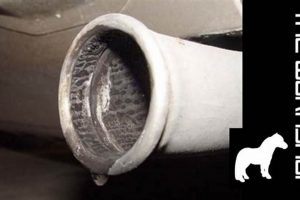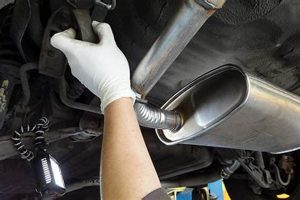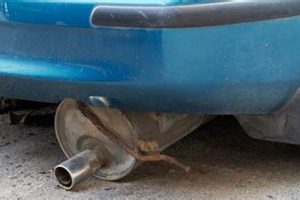The removal of a vehicle’s muffler, often referred to as a muffler deletion, involves taking off the component designed to attenuate engine noise. The primary function of the muffler is to reduce the sound pressure generated by the engine’s exhaust system. A vehicle undergoing this modification will exhibit a noticeably louder exhaust note.
The desirability and consequences of this alteration are multifaceted. Historically, modifications to exhaust systems were primarily motivated by perceived improvements in engine performance and aesthetics. Proponents often argue that a less restrictive exhaust flow enhances horsepower, although measurable gains can be minimal in many street-driven applications. The altered sound profile is also a significant factor for some vehicle owners. However, the absence of a muffler can lead to increased noise pollution, potentially violating local ordinances and impacting the surrounding environment.
The following sections will delve into the potential impact of exhaust modifications on vehicle performance, legal considerations concerning noise levels, and the potential effects on other components within the exhaust system and overall vehicle health.
Considerations Regarding Exhaust Modifications
Modifying a vehicle’s exhaust system requires careful consideration of several factors to avoid negative consequences. Understanding the potential ramifications is crucial before initiating such a modification.
Tip 1: Research Local Regulations: Noise ordinances vary widely by jurisdiction. Prior to any exhaust modification, investigate local laws regarding permissible noise levels from vehicles. Failure to comply can result in fines or legal action.
Tip 2: Assess Performance Impact: While some believe exhaust modifications improve performance, gains are often marginal in naturally aspirated engines without corresponding engine management tuning. Evaluate potential performance benefits against potential drawbacks.
Tip 3: Evaluate Resale Value: Extensive modifications, including exhaust deletions, may negatively impact a vehicle’s resale value. Potential buyers might view such alterations as detrimental to the vehicle’s long-term reliability or indicative of improper maintenance.
Tip 4: Consider Environmental Impact: Modified exhaust systems may alter emissions characteristics. Ensure any modifications comply with environmental regulations and do not negatively impact air quality.
Tip 5: Professional Installation Recommended: Improper installation of exhaust components can lead to leaks, damage to other vehicle systems, and reduced performance. Engaging a qualified mechanic is advised.
Tip 6: Potential for Drone: Exhaust modifications, especially deletions, can introduce a phenomenon known as “drone,” which is a sustained, low-frequency noise inside the vehicle cabin. This can be particularly noticeable at highway speeds and may lead to driver fatigue.
Tip 7: Catalytic Converter Impact: Muffler deletes should not involve the removal or alteration of the catalytic converter. Tampering with or removing the catalytic converter is illegal in many regions and can result in significant fines and failure to pass emissions tests.
Careful planning and execution are essential to ensure that any changes to the exhaust system align with legal requirements, personal preferences, and the vehicle’s overall performance.
The next section will explore alternative exhaust modifications that offer a balance between sound enhancement and responsible vehicle operation.
1. Legality
The legal ramifications of muffler deletion are paramount when considering alterations to a vehicle’s exhaust system. Non-compliance with applicable laws can result in fines, vehicle impoundment, and mandatory remediation.
- Noise Ordinances
Local municipalities often have specific noise ordinances that regulate the permissible decibel levels emitted by vehicles. These ordinances may define maximum sound levels at specific distances and under certain operating conditions. A muffler delete invariably increases the sound output, increasing the risk of violating these regulations. Measurement methods and enforcement protocols vary, making adherence challenging without proper testing.
- State Vehicle Codes
State vehicle codes frequently address exhaust system requirements, including the presence and functionality of mufflers. These codes may stipulate that vehicles must maintain their original equipment or functionally equivalent replacements. A muffler delete, being the removal of a factory-installed component, could be construed as a violation, potentially leading to failed inspections or citations. Furthermore, these codes may address “unnecessary noise,” a subjective criterion open to interpretation by law enforcement.
- Federal Regulations
Federal regulations, primarily enforced through the Environmental Protection Agency (EPA), establish standards for vehicle emissions and noise control. While typically focused on manufacturers, tampering with emission control devices (such as catalytic converters) in conjunction with a muffler delete could indirectly violate federal law. Although a muffler itself does not directly affect emissions, its removal can motivate further modifications that do.
- Inspection Requirements
Many states require periodic vehicle inspections, including safety and emissions checks. A muffler delete can lead to automatic failure of these inspections if the inspector deems the exhaust system non-compliant with state vehicle codes. This failure can prevent vehicle registration renewal, rendering the vehicle legally inoperable on public roads until the exhaust system is restored to its original configuration.
The legal landscape surrounding muffler deletes is complex and subject to local interpretation. The potential for fines, inspection failures, and legal action necessitates thorough research into applicable regulations before undertaking such a modification. Prudence dictates verifying compliance to avoid legal repercussions.
2. Performance
The perceived impact on vehicle performance is a central argument both for and against muffler deletion. Claims of horsepower and torque gains often motivate this modification, yet the actual effects can be nuanced and dependent on various factors.
- Exhaust Flow Dynamics
The premise behind performance enhancements through muffler deletion hinges on the reduction of exhaust backpressure. A less restrictive exhaust system, it is argued, allows the engine to expel exhaust gases more efficiently, leading to improved volumetric efficiency and, consequently, increased power output. However, the extent to which a muffler restricts exhaust flow varies significantly depending on the vehicle model and the design of the original muffler. In many modern vehicles, the stock exhaust system is already optimized for a balance between performance and noise reduction, minimizing potential gains from muffler removal.
- Engine Management System Calibration
Modern vehicles are equipped with sophisticated engine management systems (EMS) that monitor and adjust various engine parameters to optimize performance and emissions. A significant alteration to the exhaust system, such as muffler deletion, can disrupt the intended operation of the EMS. While some vehicles may adapt to minor changes, others might require recalibration or aftermarket tuning to fully realize any performance benefits from the modified exhaust. Without proper tuning, the engine could experience suboptimal air-fuel ratios, potentially leading to decreased power output or even engine damage.
- Torque Curve Characteristics
Muffler deletion can alter the engine’s torque curve, affecting the vehicle’s drivability. While peak horsepower might increase slightly at higher RPMs, the low-end torque could suffer due to reduced exhaust backpressure. This shift in the torque curve can make the vehicle feel less responsive during everyday driving situations, particularly at lower engine speeds. The trade-off between peak power and low-end torque should be carefully considered based on the intended use of the vehicle.
- Resonance and Scavenging Effects
The exhaust system’s design, including the muffler, is often engineered to exploit resonance and scavenging effects, which can enhance cylinder filling and improve engine efficiency. Removing the muffler can disrupt these carefully tuned dynamics, potentially negating any perceived performance gains. In some cases, the altered exhaust flow can even lead to a decrease in overall engine performance, especially in vehicles with complex exhaust manifold designs.
Ultimately, the impact of muffler deletion on vehicle performance is highly variable and often overstated. While some vehicles might experience a marginal increase in peak horsepower, the trade-offs in terms of low-end torque, engine management system compatibility, and overall drivability should be carefully evaluated. The perceived performance benefits must be weighed against the potential for decreased fuel efficiency, increased noise levels, and potential legal ramifications.
3. Emissions
The topic of emissions is critically linked to the question of the suitability of muffler deletion. While a muffler itself primarily addresses noise reduction, modifications to the exhaust system can have indirect yet significant implications for a vehicle’s emissions profile and compliance with environmental regulations.
- Catalytic Converter Interference
Although a muffler delete does not directly involve the removal of the catalytic converter, a component critical for reducing harmful emissions, the alteration can create a cascade effect. A driver seeking to increase exhaust flow and auditory volume by removing the muffler might be tempted to tamper with or remove the catalytic converter as well. Such modifications are illegal in many jurisdictions and result in increased output of pollutants such as hydrocarbons, carbon monoxide, and nitrogen oxides. Complete removal renders the vehicle non-compliant with emissions standards and harmful to air quality.
- Oxygen Sensor Functionality
The proper functioning of oxygen sensors is essential for maintaining optimal air-fuel ratios and minimizing emissions. These sensors, located upstream and downstream of the catalytic converter, provide feedback to the engine control unit (ECU). Changes to exhaust flow dynamics resulting from muffler deletion can affect the accuracy of oxygen sensor readings. Discrepancies in readings can lead to incorrect fuel injection adjustments, increasing the production of pollutants. If the exhaust modification causes leaks or alters backpressure significantly, the oxygen sensors might provide erroneous information, exacerbating emissions issues.
- Exhaust System Leaks
Improper installation of a muffler delete can lead to exhaust leaks. These leaks can occur at the joints between exhaust pipes or at the connection to the catalytic converter. Exhaust leaks not only diminish engine performance and create undesirable noises but also allow uncombusted hydrocarbons and other pollutants to escape into the atmosphere. The escaping gases bypass the catalytic converter, negating its pollution-reducing effects. Regular inspection and professional installation are necessary to prevent such leaks and maintain emissions compliance.
- Impact on Emission Testing
Many jurisdictions mandate periodic vehicle emissions testing. During these tests, vehicles are assessed for compliance with established pollutant output thresholds. A vehicle with a muffler delete, particularly if it has also undergone other exhaust modifications or suffers from exhaust leaks, is more likely to fail these tests. Failure can result in fines and the requirement to restore the vehicle to its original, compliant configuration before it can be legally operated on public roads. The expense and inconvenience of failing an emissions test serve as a deterrent to unauthorized exhaust modifications.
The relationship between muffler deletion and emissions highlights the complex interconnectedness of vehicle systems. While the muffler itself is not directly responsible for emissions control, its removal can indirectly compromise the functionality of emissions-related components and increase the risk of non-compliance with environmental regulations. A holistic approach, considering the potential impact on all aspects of vehicle operation, is essential when contemplating such modifications.
4. Resale Value
A modified exhaust system, particularly one involving a muffler deletion, can exert a detrimental effect on a vehicle’s resale value. Potential buyers often perceive such modifications as indicators of aggressive driving habits or a lack of adherence to factory maintenance protocols. The perception, whether accurate or not, directly impacts the vehicle’s attractiveness in the secondary market, leading to decreased offers. Examples of this phenomenon are prevalent across various vehicle segments, from economy cars to performance vehicles, where modifications are viewed with skepticism by prospective owners.
The importance of retaining factory components or opting for professionally installed, reputable aftermarket systems cannot be overstated. Modifications that deviate significantly from the original design, like muffler deletes, often raise concerns about potential mechanical issues or emissions compliance, further eroding buyer confidence. A potential purchaser may incur additional expenses to restore the vehicle to its original condition, justifying a lower purchase price. Furthermore, modified vehicles may appeal to a narrower segment of buyers, limiting the potential for competitive bidding and resulting in a lower final sale price.
Ultimately, while modifications may enhance the driving experience for the current owner, the long-term financial implications must be considered. Muffler deletion, and other similar alterations, introduce risks that impact resale value negatively. Prudent vehicle owners weigh these factors carefully before making modifications, balancing personal preferences with financial considerations. Maintaining a vehicle’s original configuration, or opting for documented, reversible modifications, helps to preserve its value in the used car market and provides peace of mind regarding future sales.
5. Noise Pollution
Noise pollution, defined as unwanted or excessive sound that can have deleterious effects on human health and the environment, is directly exacerbated by modifications such as muffler deletions. The increased sound intensity generated by vehicles lacking mufflers contributes to auditory discomfort and can negatively impact quality of life in residential and urban areas.
- Increased Decibel Levels
Muffler deletion results in a substantial increase in decibel levels emitted by a vehicle. While standard exhaust systems are designed to attenuate engine noise, the absence of a muffler allows sound waves to propagate freely, leading to significantly louder vehicle operation. Prolonged exposure to elevated decibel levels can cause hearing damage, stress, and sleep disturbances in individuals residing near roadways or areas with high vehicle traffic.
- Disruption of Ambient Soundscapes
Muffler deletions disrupt the natural or intended soundscape of a given environment. The altered sound profile contrasts sharply with the expected auditory backdrop, creating a jarring effect. Residential areas, parks, and other spaces designed for relaxation and tranquility are negatively impacted by the intrusion of excessively loud vehicles. The alteration of soundscapes reduces the aesthetic value of the environment and detracts from the overall sense of community.
- Community Annoyance and Complaints
The heightened noise levels associated with muffler deletions often lead to community annoyance and increased noise complaints. Residents subjected to persistent and excessive vehicle noise may experience frustration, sleep deprivation, and diminished property values. Local authorities may be compelled to allocate resources to address noise complaints and enforce noise ordinances, diverting attention from other community needs.
- Psychological and Physiological Effects
Exposure to excessive noise has been linked to a range of psychological and physiological effects. Studies have shown a correlation between noise pollution and increased stress levels, elevated blood pressure, and cardiovascular problems. Chronic exposure to loud vehicle noise can contribute to anxiety, irritability, and reduced cognitive performance. Vulnerable populations, such as children and the elderly, are particularly susceptible to the negative health impacts of noise pollution.
The consequences of muffler deletions extend beyond the immediate auditory experience, impacting community well-being and environmental health. The increased noise levels associated with this modification contribute to noise pollution, disrupt ambient soundscapes, and can lead to adverse psychological and physiological effects. These considerations underscore the importance of adhering to noise regulations and promoting responsible vehicle modifications that minimize environmental and social impact.
Frequently Asked Questions About Muffler Deletion
The following questions and answers address common concerns surrounding the removal of a vehicle’s muffler. The information provided is intended to offer clarity on the potential ramifications of this modification.
Question 1: Is muffler deletion illegal?
The legality of muffler deletion depends on local and state noise regulations. Many jurisdictions have noise ordinances that restrict the permissible decibel levels emitted by vehicles. Muffler deletion often results in noise levels that exceed these limits, potentially leading to fines or legal penalties.
Question 2: Does muffler deletion improve engine performance?
While some argue that muffler deletion enhances engine performance by reducing backpressure, measurable gains are often minimal, particularly in naturally aspirated engines. The impact on performance can be influenced by factors such as engine management system calibration and the overall design of the exhaust system.
Question 3: Will muffler deletion affect my vehicle’s emissions?
Muffler deletion itself does not directly impact emissions, as the muffler is primarily responsible for noise reduction. However, modifying the exhaust system can indirectly affect emissions if it leads to tampering with the catalytic converter or causes exhaust leaks. Such modifications may result in non-compliance with emissions regulations.
Question 4: How does muffler deletion impact resale value?
Muffler deletion can negatively affect a vehicle’s resale value. Potential buyers may view this modification as an indication of aggressive driving or neglect of proper maintenance. Restoring the exhaust system to its original configuration before selling the vehicle is often advisable.
Question 5: What is “drone” and how is it related to muffler deletion?
“Drone” refers to a sustained, low-frequency noise inside the vehicle cabin that can occur after muffler deletion. This phenomenon is often noticeable at highway speeds and can be a source of discomfort for drivers and passengers.
Question 6: Can a muffler delete damage my engine?
While a muffler delete alone is unlikely to directly damage an engine, the modification can alter exhaust flow dynamics and potentially affect engine performance. In some cases, improper modifications to the exhaust system can lead to suboptimal air-fuel ratios or other issues that may, over time, negatively impact engine health.
Muffler deletion presents a series of considerations beyond simply increasing exhaust volume. Careful evaluation of legal ramifications, potential performance impacts, and the overall effect on the vehicle is warranted.
The subsequent section offers a conclusion, summarizing the core arguments and providing a final assessment of the modification.
Conclusion
The multifaceted exploration of “is muffler delete bad for car” reveals a confluence of factors that extend beyond simplistic assessments. This modification, involving the removal of a crucial component designed for noise attenuation, carries implications ranging from legal compliance and environmental responsibility to vehicle performance and economic impact. The analysis demonstrates that while perceived performance gains may entice some vehicle owners, the potential downsides often outweigh the advantages.
Ultimately, decisions regarding exhaust system modifications warrant careful consideration and a comprehensive understanding of potential consequences. Prioritizing legal adherence, environmental consciousness, and the long-term value of the vehicle serves as a prudent approach. Responsible vehicle ownership necessitates informed choices that align with both individual preferences and the broader interests of society.







